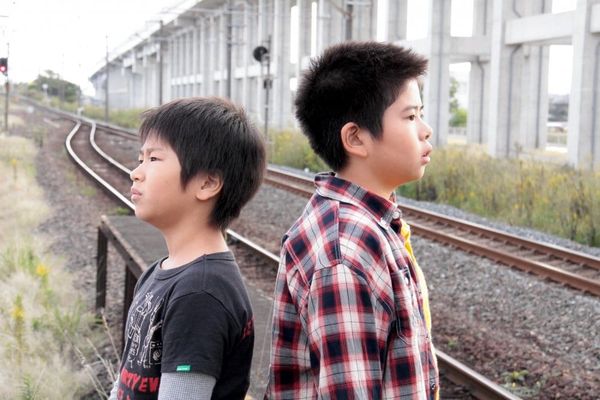Eye For Film >> Movies >> I Wish (2011) Film Review
I Wish
Reviewed by: Amber Wilkinson

Hirokazu Kore-eda's childhood adventure is a sweet and subtle tale of friendship, generosity of spirit and the triumph of hope over expectation.
Elements of the story of Koichi (Koki Maeda) and his younger brother Ryu (Ohshiro Maeda) may be wistful and even bordering on the mystical at one point, but their story is also rooted in a reality that has no time for overcooked sentiment.

Separated by a parental split, 12-year-old Koichi is now living with his mum (Nene Ohtsuka) and grandparents in Kagoshima, a small town nestling in the shadow of a dust-spewing volcano. His parents may have split up but Kore-eda knows better than to present this as a one-trick emotion. Koichi is missing his family unit and, particularly, his younger brother, but he also has a solid group of new friends.
Ryu meanwhile is living with his struggling-musician dad in the city, a 10-year-old bundle of excess energy who, although feeling the absence of his brother is also cushioned by a circle of friends and bolstered by the kind of unfocused anticipation of good things happening in the future with which youngsters are often blessed. Both brothers, and their friends, run everywhere, with the energy of children who know anything can be accomplished if they just hurry up.
When Koichi hears that miracles can be granted to those who see the high-speed bullet trains pass one another, he and Ryu hatch a plot to try to reunite their family and each take a gaggle of friends - with their own eclectic assortment of desires - along for the ride. The film's title in Japanese translates as miracle, although the more aspirational I Wish is a perfect fit.
Metaphors are woven into the fabric of Kore-eda's film, from the thick layer of ash that falls silently from the volcano onto the town to Koichi and Ryu's grandfather's old-fashioned karukan cake, which is either too faint or mellow in flavour depending on your viewpoint - but they are there for you to think about if you wish to and help underpin the narrative rather than crushing it from above.
Kore-eda keeps us with the kids, exploring their firm belief in an ability to change the inevitable, which even in the face of evidence to the contrary, is endearingy robust. Subplots and asides focus on the inconsequentialities of life, growing up and ageing, but this is a place where ideas are explored non-judgementally and with balance.
"There's room for wasteful things," Ryu's dad insists. "Yes, But you can't just have waste," comes the reply.
The director draws beautiful, understated performances from the children, no doubt helped by the fact that Koki and Ohshiro are brothers in real life, and his film is peppered with moments that feel natural even as they defy convention - such as brothers bonding not in a hug but back to back or the poignancy of a remembered childhood snapped back into focus through a simple act of hairbrushing.
All life in its haphazard glory is here, but it's the children's friendship that holds you tight - and as the two trains crossed on the cinema screen, I wished more films about childhood were as good as this.
Reviewed on: 28 May 2013
















